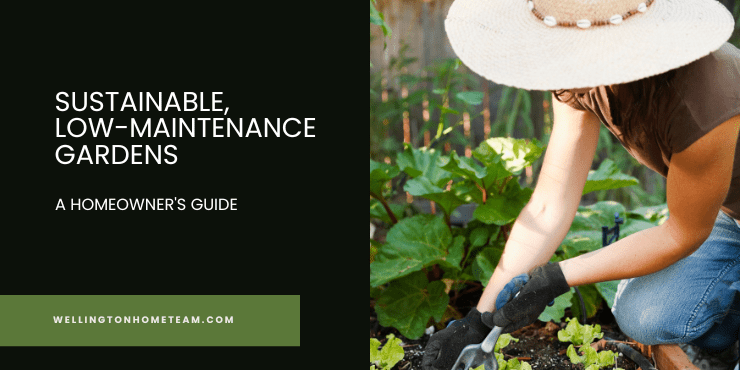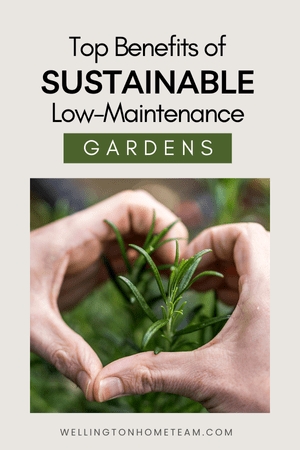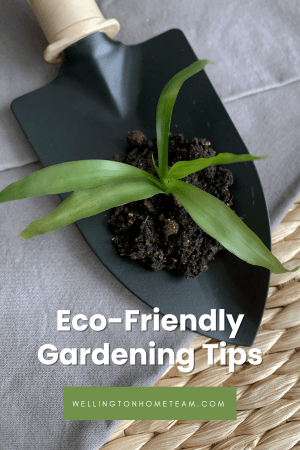Sustainable, Low-Maintenance Gardens: A Homeowner’s Guide
Considering that awareness of environmental-friendly lifestyle changes is on the rise, it’s about time homeowners start practicing sustainability in their homes, especially the outdoors. Creating a low-maintenance garden that’s sustainable requires careful thought for each element in your yard; this includes landscaping, plant selection, soil care, watering and nutrition, and general upkeep. For those new to gardening, our guide will help you create a perfect garden that suits your needs and is safe for the environment.

What Is Green Landscaping?
The general need for landscaping is to modify land to improve its functionality and make it aesthetically appealing for daily use. Common activities include planting, maintenance, pruning, paving, and more.
Green or eco-landscaping is just that, but it also has a central focus on sustainable practices that help the environment. The three main principles that build the foundation of sustainable landscaping and gardening include:
- Conserving Resources: Energy, water, plants, gardening materials, etc., are essential resources for a garden. Energy-efficient gardening methods, upcycled or recycled materials, and climate-friendly plants are essential sustainable practices.
- Protecting The Soil: The nutrients and microorganisms in soil are important to the plants and wildlife in your garden. Keeping it safe from degradation, compaction, and erosion ensures the soil is healthy and can sustain life.
- Holistic Biodiversity: A combination of native plants means more climate resilience; this naturally creates a habitat for local wildlife. As the ecosystem buds, it will also aid pollination and provide natural pest control.
Benefits Of Sustainable, Low-Maintenance Gardens
Now that you know the basics of sustainable gardening and landscaping, you may wonder how it will benefit you as a homeowner. Let’s move on to the reasons why taking the sustainable, low-maintenance garden route is not just good for the environment but is also a smart choice if you own a home:
- Increases Curb Appeal: The residential real estate market rewards sustainable homes. Eco-friendly landscaping helps improve curb appeal, a critical factor that makes or breaks many homebuyers’ decisions. Plus, studies show that sustainable homes with less upkeep might sell for a higher price and get taken off the market faster than non-sustainable homes.
- Reduces Utility Costs: Strategic landscape design and water conservation practices like xeriscaping, planting drought-tolerant plants, solar-powered electricity for garden activities, composting, etc., minimize the cost of water and electricity bills and gardening supplies.
 Disease and Pest Management: Integrated pest management (IPM) techniques take care of pests and disease-causing pathogens naturally, reducing the need for chemical treatments and extensive maintenance while keeping your garden lush and healthy.
Disease and Pest Management: Integrated pest management (IPM) techniques take care of pests and disease-causing pathogens naturally, reducing the need for chemical treatments and extensive maintenance while keeping your garden lush and healthy. - Self-Sufficiency: A sustainable garden allows you to grow your own produce and use homemade compost to fertilize your plants; this not only manages waste but also reduces your dependency on store-bought items. According to the chairman of Burpee Seeds, you can save up to $25 on grocery bills for planting a $1 seed.
- Aesthetic Yard: Besides its ethical and economic advantages, a simple, sustainable garden creates an ambient outdoor atmosphere that seamlessly blends with nature. With the right plants and appropriate design, your garden will transform into an eye-catching scene with wildlife and pollinators.
- Harsh Weather Resistance: Having hardy plants in your garden means you don’t have to worry about excess watering or frail plants that die quickly. As a result, you save water, time, and effort during times with less rainfall or harsh weather conditions. Plus, these plants are resistant to pest damage, which also eliminates the need for unnecessary treatments.
- Improves Health: A well-kept outdoor space and gardening enhances mental and overall health. Plus, it keeps a check on allergens like mold or pollen that are common causes of respiratory and allergy issues. Similarly, plants absorb carbon dioxide, improving the air quality in your surroundings.
Eco-Friendly Gardening Tips
If you’re new to sustainable gardening practices, the initial stages can get confusing, especially with so many opinions out there. Here are the basic practices from gardening experts to help you kickstart your journey:
Water Smartly
Don’t simply go to your garden with a water hose. Instead, install efficient irrigation systems like drips or soaker hoses that directly water the roots; this reduces water waste and plant diseases like fungal infections on wet leaves. You can also group plants based on their watering needs to keep track of the right amount and simply your irrigation process. When watering your plants, choose the coolest part of the day to let the water seep deeper by reducing evaporation.
Avoid Chemical Additives
Standard outdated gardening techniques involved simply dumping copious amounts of chemicals in the name of plant care. However, these chemicals strip the soil of its essential nutrients while disrupting the delicate balance of the garden ecosystem. Some can even damage plants, especially when used in inappropriate quantities. Fortunately, many eco-friendly alternatives are available. You can use neem oil or diatomaceous earth as natural insecticides, hand weed using tools instead of weedicides, and use natural fertilizer.
 Know Your Soil
Know Your Soil
It’s common for people to plant gardens without assessing the soil’s properties. Plus, if you’ve done any construction work in your garden, the heavy machinery can damage the soil’s quality due to compaction and topsoil loss.
So, prep your soil by keeping it well-aerated and nutrient-rich. If you have water-logging issues, install drainage fabric to prevent erosion and maintain soil stability by providing adequate drainage and filtration.
Organic Mulching
Mulching is an age-old practice that retains solid moisture and reduces the temperature so the plants remain healthy. It also prevents weed growth and can reduce water-guzzling lawn spread if you spread it across your landscape. Use mulch materials like bark, leaves, pine needles, wood chips, and hay; this ensures the organic compounds break down, an added bonus for the soil’s nutrients.
Grow Native Plants
Planting native species ensures your garden is lush and healthy because these plants thrive in that weather. Plus, native flora attracts natural wildlife, which benefits the overall biodiversity while keeping invasive plants, pests, and diseases at bay. These plants also require very little maintenance and significantly help conserve water.
Plant Ground Cover
Traditional lawns consume a lot of water and require regular upkeep with the least benefit to soil and wildlife. Instead, switch laws to cover crops that protect the soil rather than take from it. Cover crops also reduce weed growth and improve soil tilth, aeration, and moisture. Since ground crops hug the surface, they require little to no mowing, watering, or chemicals, making them pretty low-maintenance and ideal for home gardens.
Composting
If you use your kitchen enough and have a decent garden, organic waste is inevitable. Instead of tossing this into the garbage disposal, convert your kitchen scraps, garden clippings, or trimmings into a nutrient-dense compost. This way, you reduce your contribution to endless landfills while producing natural fertilizer at no additional cost. You can compost any organic matter, from eggshells, vegetable scraps, and dead leaves to wood shavings, newspaper, and cardboard.
Rain Water Harvesting
If you’re fortunate enough to live in a region with sufficient rainfall, rainwater harvesting is one of the simplest ways to be eco-friendly. You can choose a basic harvesting system, such as rain barrels, chains, cisterns, etc., with features that capture stormwater runoff from roofs and gutters. You can use the collected rainwater to water your garden, immensely reducing outdoor water usage.
How To Keep Things Low-Maintenance In Your Yard
The four pivotal benefits of a low-maintenance garden are their time efficiency, cost-effectiveness, aesthetic appeal, and eco-friendliness. So, you’ve been looking for ways to make your gardening schedule less hectic, here are some tips that will help:
- Choosing the Right Plants: Drought-tolerant, native, and perennial plants require less work. Select plants like succulents, woody herbs, coneflowers, poppies, and hostas to add low-maintenance color to your yard.
- Simple Yard Layout: Choosing defined borders, large planting zones, and clean lines significantly reduces maintenance complications, unlike intricate designs that require a lot of upkeep and constant attention to ensure they stay in shape.
- Hardscaping Options: Incorporating hardscaping elements like paved or gravel pathways, raising planting beds, and building patios, decks, or porches reduces the amount of space that requires care while adding aesthetic and value to your home.
- Work with the Seasons: As a rule of thumb, always remember each season has specific requirements. Spring is for pruning, fertilizing, and planting. Summer focuses on watering, weeding, and mulching. The fall needs clean-up, pre-spring planting, and irrigation. Winter needs plant protection, more pruning, and planning for the coming year.
- Automate Tasks: You can keep your garden vibrant and healthy by automating everyday tasks like watering and lighting. Install smart irrigation systems and solar-powered garden lights to save time in an eco-friendly way.
Join The Community
Once your eco-friendly, low-maintenance garden is up and running, continue to it that way by staying up to date with the latest sustainability advancements. Find like-minded individuals in your area and exchange ideas on sustainable gardening practices. This way, you can learn new techniques to reduce your carbon footprint while sharing your ideas with others.
Please consider spreading the word and sharing; Sustainable, Low-Maintenance Gardens: A Homeowner’s Guide
Sustainable, Low-Maintenance Gardens: A Homeowner's Guide | Check out these helpful tips for creating eco-friendly, low-maintenance gardens. Start practicing sustainability today! #ecofriendly #lowmaintenancegardensAbout the Author
Top Wellington Realtor, Michelle Gibson, wrote: “Sustainable, Low-Maintenance Gardens: A Homeowner’s Guide”
Michelle has been specializing in residential real estate since 2001 throughout Wellington Florida and the surrounding area. Whether you’re looking to buy, sell or rent she will guide you through the entire real estate transaction. If you’re ready to put Michelle’s knowledge and expertise to work for you call or e-mail her today.
Areas of service include Wellington, Lake Worth, Royal Palm Beach, Boynton Beach, West Palm Beach, Loxahatchee, Greenacres, and more.

 Michelle Gibson of the Hansen Real Estate Group Inc is a full-time REALTOR who has been specializing in Wellington Florida real estate since 2001. This veteran of the real estate industry has expertise in technology, marketing, and social media.
Michelle Gibson of the Hansen Real Estate Group Inc is a full-time REALTOR who has been specializing in Wellington Florida real estate since 2001. This veteran of the real estate industry has expertise in technology, marketing, and social media.